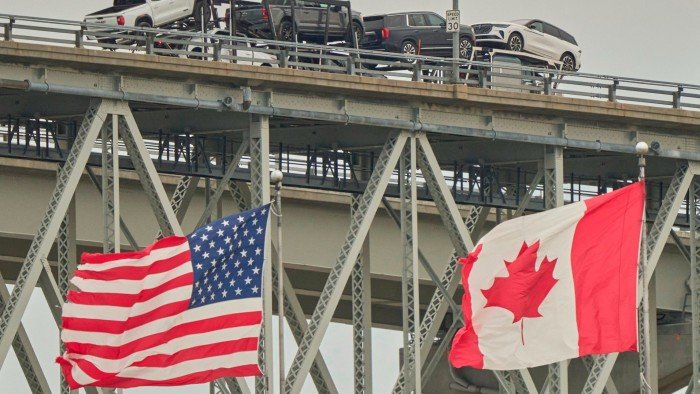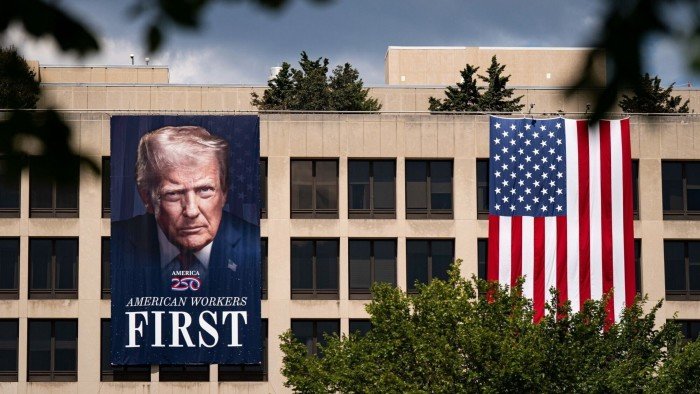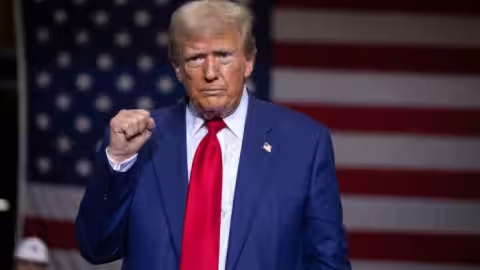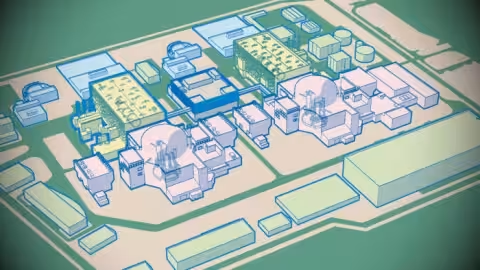Donald Trump said the US was “terminating” trade talks with Canada in retaliation against a new digital services tax on tech companies, reigniting a bitter North American trade war after months of détente.
He vowed to use America’s economic heft to hit back and set a new tariff rate on Canadian imports “within the next seven day period”.
“Canada, a very difficult Country to TRADE with . . . has just announced that they are putting a Digital Services Tax on our American Technology Companies, which is a direct and blatant attack on our Country,” the US president posted on his Truth Social platform on Friday.
“Based on this egregious Tax, we are hereby terminating ALL discussions on Trade with Canada, effective immediately,” Trump added.
Friday’s announcement plunges the two nations back into a trade war and brings an abrupt end to a period of more cordial relations that followed the election of Mark Carney as Canadian prime minister in March.
“We have a great relationship with the people of Canada,” Trump told journalists in the Oval Office on Friday afternoon. But he added: “We have all the cards, every single one. We don’t want to do anything bad but economically we have such power over Canada.”
Carney — who was propelled to the premiership on a surge of anti-US sentiment — sought to reset relations with Washington that had grown strained under his predecessor Justin Trudeau.
Early meetings between Carney and Trump proved friendly and Carney said this month that the pair had agreed at the G7 summit in the Canadian Rockies “to pursue negotiations towards a deal within the coming 30 days”. But Trump’s outburst threatens to undo that progress.
“The Canadian government will continue to engage in these complex negotiations with the United States in the best interests of Canadian workers and businesses,” the prime minister’s office said.
The Canadian dollar fell on Trump’s statement as traders reacted to the fresh escalation of the trade dispute, leaving it down 0.7 per cent against the US dollar on the day. The S&P 500 also fell from its highs of the day, but the blue-chip index remained up about 0.3 per cent.
Trump’s broadside comes after Canadian finance minister François-Philippe Champagne said this month that Ottawa was “going ahead” with plans for a digital services tax despite the misgivings of the Trump administration.
The measure would hit tech groups with a 3 per cent levy on revenue earned from Canadian users and has been opposed by Silicon Valley.
Foreign companies such as Meta, Netflix and Amazon, as well as local businesses, must file a return for the tax by the end of the month or face a fine. The tax will be backdated to 2022.
“Obviously, we think it’s patently unfair to do it retroactively,” US Treasury secretary Scott Bessent told CNBC on Friday. “This is something from the Trudeau years so we were hoping as a sign of goodwill that the new Carney administration would at least put a brake on that during the trade talks. They seem not to have.”
Bessent said US trade representative Jamieson Greer would probably launch an investigation into unfair trade practices over the matter that could trigger further tariffs on Canadian products.
The president said Canada’s tax “copied” those imposed in some EU member states. “And it’s not going to work out well for Europe either,” Trump said. But he added negotiations with the EU were still under way.
Trump also hit out at Canadian agricultural policy, a long-standing area of contention between the countries dating back to the president’s first term.
“They have charged our Farmers as much as 400% Tariffs, for years, on Dairy Products,” he wrote in his Truth Social post on Friday.
Canada recently passed legislation on “supply management” measures to protect its dairy industry through price setting and production quotas — a system described by Trump in 2017 as a “disgrace”.
Trump’s return to office sparked a tit-for-tat trade war between Washington and Ottawa after he announced sweeping 25 per cent tariffs on Canadian goods. Those levies were later amended with carve-outs for goods covered by the USMCA trade deal, but new sectoral tariffs on steel and aluminium have hit Canada hard.
The trade acrimony — alongside the president’s threat to annex Canada as the 51st US state — has triggered a surge of resentment north of the border.
Canadian industry groups slammed the digital services tax on Friday and urged the government to scrap it in order to placate Trump.
“For many years, we have warned that the implementation of a unilateral digital services tax could risk undermining Canada’s economic relationship with its most important trading partner, the United States,” said Goldy Hyder, president of the Business Council of Canada. “That unfortunate development has now come to pass.”
Candace Laing, president of the Canadian Chamber of Commerce, said the tax was “self-defeating in nature” but added that she hoped it would not derail trade talks between the countries.
“Negotiations go through peaks and valleys. With deadlines approaching, some last-minute surprises should be expected,” she added. “The tone and tenor of talks has improved in recent months, and we hope to see progress continue.”























